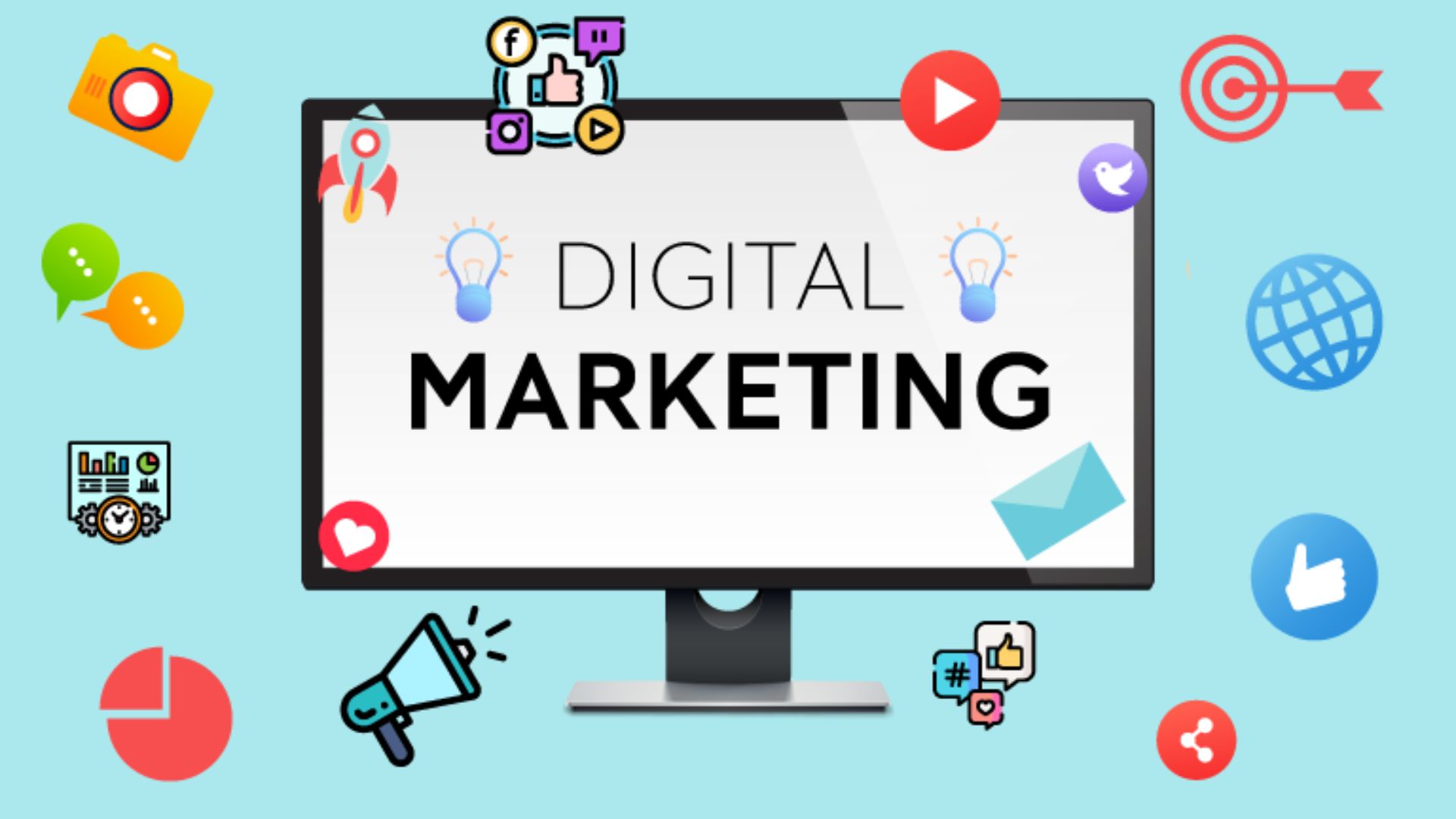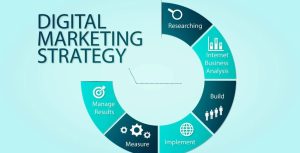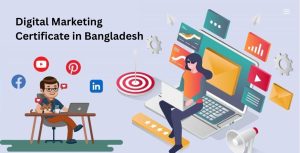When we talk about the digital marketing definition in 2025, we are no longer referring to a simple concept of advertising products on the internet. Instead, digital marketing has become an all-encompassing approach to connecting businesses with their target audiences using digital channels, platforms, and tools that provide both reach and precision. Unlike traditional marketing, which relied on broadcasting messages to mass audiences through TV, radio, or billboards, digital marketing is interactive, measurable, and highly personalized. It covers every aspect of the online ecosystem—search engines, social media platforms, websites, email, mobile apps, and even AI-powered virtual assistants. At its core, the digital marketing definition is about creating meaningful interactions with people where they spend their time online and guiding them through a customer journey that transforms curiosity into trust and ultimately into sales. In today’s competitive world, understanding what digital marketing truly means is crucial because it helps businesses not only attract attention but also sustain long-term relationships in an environment where consumer behavior is constantly shifting. By 2025, no business—whether small, medium, or large—can afford to ignore the necessity of building its presence around the principles included in the modern digital marketing definition.
Introduction to Digital Marketing
The Evolution from Traditional to Digital Marketing
Marketing has always existed as a way for businesses to reach customers, but the tools used have changed dramatically. The shift from traditional to digital marketing didn’t happen overnight—it began with the rise of the internet in the late 1990s, when companies realized that websites and emails could supplement their print ads and TV commercials. Over time, as search engines like Google, Yahoo, and Bing became central to everyday life, businesses had to adapt to the fact that customers were searching for solutions online instead of flipping through newspapers. The spread of smartphones and social media platforms accelerated this evolution, as people started spending hours on apps like Facebook, Instagram, and Twitter, making these spaces fertile ground for business promotions. Today, the digital marketing definition includes a mix of strategies that connect with people across multiple touchpoints—when they search, scroll, shop, or stream. This evolution redefined the very essence of marketing, making it not just about pushing a message but also about engaging in two-way conversations.
Why Understanding the Definition of Digital Marketing Matters Today
In a world flooded with content, ads, and brand messages, having a clear grasp of the digital marketing definition is more important than ever. Too often, businesses assume digital marketing is just posting on social media or running a few Facebook ads, but in reality, it is a structured approach to promoting and sustaining business growth. Understanding the digital marketing definition helps companies design comprehensive strategies that align with customer behavior and deliver measurable outcomes. For instance, knowing the true meaning of digital marketing encourages businesses to focus on SEO to ensure visibility on search engines, to use content marketing to educate and nurture leads, and to rely on analytics for optimizing performance. Without this understanding, businesses risk wasting time and money on disconnected efforts that fail to drive results. Today’s business environment demands not just participation in digital channels but also a deep understanding of how these channels fit together in a unified strategy.
Digital Marketing Definition Explained
What is Digital Marketing? (Simple Definition for Beginners)
The digital marketing definition can be simplified as the use of digital platforms and tools to promote products, services, or ideas and to connect businesses with their target audiences in a measurable way. For beginners, it is essential to understand that digital marketing is not limited to online advertising but includes every aspect of an online presence. This ranges from optimizing a website to appear higher in search results, publishing blog articles to build trust, engaging audiences on social media to increase awareness, and nurturing leads through email campaigns. Unlike traditional marketing, which is often difficult to track, digital marketing provides precise data, allowing businesses to understand what works, what doesn’t, and where they should focus their budgets.
Core Elements of Digital Marketing in Business
When we break down the digital marketing definition into its core elements, several pillars emerge. Search Engine Optimization (SEO) ensures that a business website is visible to people actively searching for related products or services. Content marketing builds trust by providing valuable insights through blogs, videos, and guides. Pay-Per-Click (PPC) advertising delivers instant visibility, while email marketing maintains ongoing relationships. Analytics ties all of these elements together by measuring effectiveness and providing insights for improvement. The digital marketing definition is incomplete without recognizing how these elements interconnect to create a seamless customer experience.
Difference Between Digital Marketing and Traditional Marketing
The difference between digital marketing and traditional marketing lies not only in the medium but also in the level of interaction and measurability. Traditional marketing relies on static advertisements where businesses broadcast messages to broad audiences with little feedback. Digital marketing, as defined today, involves dynamic, interactive channels where customers respond instantly, whether through clicks, shares, likes, or comments. Traditional ads might reach thousands, but businesses have no idea how many were interested, while digital marketing provides exact figures on impressions, conversions, and ROI. This precision makes digital marketing superior for most businesses, though the two can be combined for even greater effect.
Types of Digital Marketing
Search Engine Optimization (SEO)
Search Engine Optimization, commonly known as SEO, is the backbone of digital marketing because it is the method that allows businesses to appear in front of potential customers exactly when they are searching for information, products, or services online. SEO focuses on optimizing a website’s content, structure, and technical setup so that search engines like Google can crawl, understand, and rank the site higher in search results. The process involves keyword research, where marketers identify what their target audience is searching for, and then optimize website pages, blogs, and even product descriptions with those terms naturally and strategically. But SEO doesn’t stop at just keywords—it also includes creating high-quality, valuable content, building backlinks from credible sites, improving website speed and mobile usability, and ensuring a seamless user experience. What makes SEO particularly powerful is its ability to deliver long-term, organic traffic that builds trust and authority. While paid advertising stops the moment you stop spending money, SEO can keep delivering leads and customers for months or even years once it is properly implemented. In today’s digital-first world, businesses that ignore SEO often struggle to get discovered, while those who invest in it enjoy consistent online visibility, stronger brand authority, and sustainable growth.
Content Marketing
Content marketing is another vital type of digital marketing because it focuses on creating and distributing valuable, informative, and engaging content that attracts and nurtures potential customers. Instead of pushing sales messages directly, content marketing builds trust and relationships by offering knowledge, solutions, or entertainment that addresses the needs of the audience. This content can take many forms such as blog articles, videos, podcasts, eBooks, case studies, infographics, or newsletters. The goal is to position the business as an authority in its field while guiding the audience through the buyer’s journey—from awareness to consideration to decision-making. For example, a company selling fitness equipment may publish blog posts about workout routines, produce videos showing product usage, and share success stories from customers. Over time, this consistent content establishes credibility and encourages people to choose the brand over competitors. Content marketing also works closely with SEO since high-quality content is what search engines prioritize when ranking websites. In addition, strong content fuels social media engagement and email campaigns, making it one of the most versatile and cost-effective marketing approaches.
Social Media Marketing (SMM)
Social Media Marketing is the practice of using platforms like Facebook, Instagram, Twitter, LinkedIn, TikTok, and others to connect with audiences, promote products or services, and build a brand identity. Social media has transformed how businesses interact with customers because it provides a two-way communication channel where brands can not only broadcast their messages but also listen, engage, and build communities. Effective social media marketing involves crafting engaging posts, running targeted ad campaigns, using influencer collaborations, hosting live sessions, and responding to customer feedback in real-time. Each platform has its unique audience and strengths—for instance, LinkedIn is great for B2B marketing, while Instagram and TikTok are strong for visual storytelling and reaching younger demographics. The biggest advantage of social media marketing is its ability to humanize a brand, showcase its personality, and create loyal followers who advocate for it. Additionally, paid advertising on social platforms allows businesses to target users based on demographics, interests, and behaviors, making it a highly efficient way to reach the right people.
Pay-Per-Click Advertising (PPC)
Pay-Per-Click advertising, commonly known as PPC, is a model where businesses pay a fee each time someone clicks on their ad. Unlike SEO which takes time to build results, PPC delivers instant visibility on search engines and social platforms. Google Ads is the most well-known PPC platform, allowing businesses to bid for keywords so their ads appear at the top of search results when users search for those terms. Similarly, Facebook Ads and LinkedIn Ads enable hyper-targeted campaigns that can reach very specific audience segments. PPC campaigns can be tailored to generate leads, increase sales, or build brand awareness, depending on business goals. The strength of PPC lies in its measurability—you can track impressions, clicks, conversions, and ROI in real-time, making it easier to optimize campaigns and maximize returns. While PPC can be costly in competitive industries, when done strategically, it delivers high-quality leads and complements other long-term marketing efforts such as SEO and content marketing.
Email Marketing
Email marketing remains one of the oldest yet most effective forms of digital marketing because it creates direct communication between businesses and their customers. Unlike social media platforms, where algorithms control visibility, emails land directly in the inbox of subscribers, giving businesses full control over their messaging. Effective email marketing campaigns go beyond just promotional messages—they provide personalized, relevant content that nurtures customer relationships. Emails can be used to announce product launches, share newsletters, send special offers, deliver educational resources, or re-engage inactive customers. With automation tools, businesses can segment audiences and send tailored messages based on customer behavior, such as abandoned cart reminders or birthday offers. Email marketing consistently generates one of the highest returns on investment (ROI) in the industry because it targets an audience that has already expressed interest in the brand by subscribing. When combined with other strategies like content marketing and social media, email becomes a powerful tool for customer retention and long-term loyalty.
Affiliate Marketing
Affiliate marketing is a performance-based type of digital marketing where businesses reward individuals or companies (affiliates) for driving traffic or sales through their referrals. This model benefits both sides—the affiliate earns a commission, while the business gains customers without upfront advertising costs. Affiliate marketing often uses influencers, bloggers, or niche websites to promote products through unique referral links. For example, a tech blogger might review a new gadget and include an affiliate link for readers to purchase it, earning a commission for each sale. This type of marketing is particularly effective because it relies on trust—audiences are more likely to purchase when a recommendation comes from someone they already follow or admire. Businesses can expand their reach to new markets through affiliates without significant investment, making it an attractive option for startups and established companies alike.
Influencer Marketing
Influencer marketing has grown rapidly in recent years as social media influencers with large or highly engaged audiences have become valuable partners for brands. This strategy involves collaborating with influencers—whether celebrities, industry experts, or micro-influencers—to promote products or services authentically. Unlike traditional advertising, influencer marketing feels more personal and relatable because it leverages the influencer’s established relationship with their audience. For instance, a beauty brand might partner with a makeup artist on Instagram to demonstrate how its products are used, instantly reaching thousands or even millions of potential customers. The strength of influencer marketing lies in its ability to generate trust and social proof quickly, especially in markets where word-of-mouth and peer recommendations hold significant weight.
Digital Marketing in Business Growth
Digital marketing plays a crucial role in business growth because it provides a level playing field where both small startups and large corporations can compete effectively. Unlike traditional advertising methods that require significant budgets, digital marketing offers cost-effective ways to reach targeted audiences worldwide. Businesses can build a strong online presence, increase brand visibility, and interact directly with customers through multiple digital channels. Real-time data and analytics allow marketers to measure performance instantly, optimize strategies, and allocate budgets more efficiently. Most importantly, digital marketing provides opportunities for personalization—brands can deliver tailored experiences that resonate with individual customers, increasing loyalty and conversion rates. In today’s digital economy, businesses that fail to embrace digital marketing risk losing relevance, while those that integrate it into their core strategy unlock scalable growth and long-term success.
Digital Marketing Strategies Every Business Should Know
To fully benefit from digital marketing, businesses must adopt a mix of strategies that align with their goals. SEO and content-driven strategies ensure long-term organic visibility, while social media engagement builds brand personality and nurtures communities. Paid ads provide immediate results and visibility, especially useful for new businesses or product launches. Email campaigns keep customers engaged and loyal, while video marketing and interactive content capture attention in an age of short attention spans. By integrating these strategies into a cohesive plan, businesses can create a strong online presence, attract quality leads, and convert them into paying customers.
Benefits of Digital Marketing
The benefits of digital marketing are immense—it allows businesses to reach global audiences at a fraction of the cost of traditional marketing, while also providing data-driven insights that improve decision-making. Digital marketing offers better ROI, higher conversion rates, and the ability to track every interaction in real-time. It provides scalability, meaning businesses can start small and gradually expand campaigns as they grow. Personalization is another major advantage—using data, businesses can deliver targeted messages that resonate with individuals, increasing engagement and loyalty. Overall, digital marketing makes businesses more agile, competitive, and customer-focused.
Challenges in Digital Marketing
Despite its advantages, digital marketing comes with challenges. Search engine algorithms and social media trends are constantly changing, making it difficult to stay ahead without continuous learning. The competition is fierce as every business is trying to capture online attention, leading to ad fatigue and content saturation. Managing budgets effectively and achieving measurable results can also be complex, especially for small businesses. Moreover, digital marketing requires a wide range of skills and tools—from analytics to creative content production—which can overwhelm companies without proper resources. However, these challenges can be overcome with a clear strategy, continuous upskilling, and leveraging automation tools.
The Future of Digital Marketing
The future of digital marketing will be shaped by technological advancements and changing consumer behaviors. Artificial intelligence and automation are already transforming how businesses collect data, analyze customer behavior, and deliver personalized experiences at scale. Voice search, smart devices, and conversational AI like chatbots are making interactions more natural and intuitive. Video and interactive content will continue dominating consumer preferences, while data privacy and ethical marketing will play bigger roles in building trust. Businesses that adapt quickly to these changes and embrace innovation will stay ahead in the competitive landscape.
Final Thoughts on the Definition of Digital Marketing
Digital marketing is not just a trendy buzzword—it is the foundation of modern business growth. From SEO and content marketing to social media, PPC, and email, digital channels provide businesses with endless opportunities to connect with customers and drive sales. Every business, regardless of size or industry, must embrace digital marketing to remain competitive in a world where consumers live, shop, and interact online. The definition of digital marketing goes beyond just tools and tactics—it is about building meaningful connections, delivering value, and staying adaptable in an ever-changing digital ecosystem. Businesses that integrate digital marketing into their core strategy are not only better positioned for short-term wins but also for long-term sustainability and success in the digital-first economy.





